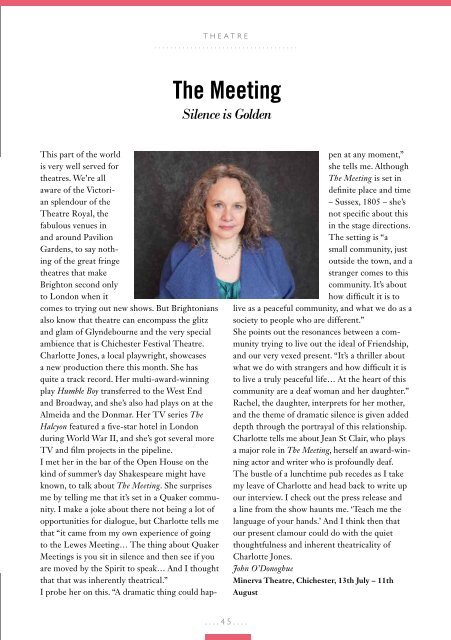Viva Brighton Issue #65 July 2018
You also want an ePaper? Increase the reach of your titles
YUMPU automatically turns print PDFs into web optimized ePapers that Google loves.
THEATRE<br />
....................................<br />
The Meeting<br />
Silence is Golden<br />
This part of the world<br />
is very well served for<br />
theatres. We’re all<br />
aware of the Victorian<br />
splendour of the<br />
Theatre Royal, the<br />
fabulous venues in<br />
and around Pavilion<br />
Gardens, to say nothing<br />
of the great fringe<br />
theatres that make<br />
<strong>Brighton</strong> second only<br />
to London when it<br />
comes to trying out new shows. But <strong>Brighton</strong>ians<br />
also know that theatre can encompass the glitz<br />
and glam of Glyndebourne and the very special<br />
ambience that is Chichester Festival Theatre.<br />
Charlotte Jones, a local playwright, showcases<br />
a new production there this month. She has<br />
quite a track record. Her multi-award-winning<br />
play Humble Boy transferred to the West End<br />
and Broadway, and she’s also had plays on at the<br />
Almeida and the Donmar. Her TV series The<br />
Halcyon featured a five-star hotel in London<br />
during World War II, and she’s got several more<br />
TV and film projects in the pipeline.<br />
I met her in the bar of the Open House on the<br />
kind of summer’s day Shakespeare might have<br />
known, to talk about The Meeting. She surprises<br />
me by telling me that it’s set in a Quaker community.<br />
I make a joke about there not being a lot of<br />
opportunities for dialogue, but Charlotte tells me<br />
that “it came from my own experience of going<br />
to the Lewes Meeting… The thing about Quaker<br />
Meetings is you sit in silence and then see if you<br />
are moved by the Spirit to speak… And I thought<br />
that that was inherently theatrical.”<br />
I probe her on this. “A dramatic thing could happen<br />
at any moment,”<br />
she tells me. Although<br />
The Meeting is set in<br />
definite place and time<br />
– Sussex, 1805 – she’s<br />
not specific about this<br />
in the stage directions.<br />
The setting is “a<br />
small community, just<br />
outside the town, and a<br />
stranger comes to this<br />
community. It’s about<br />
how difficult it is to<br />
live as a peaceful community, and what we do as a<br />
society to people who are different.”<br />
She points out the resonances between a community<br />
trying to live out the ideal of Friendship,<br />
and our very vexed present. “It’s a thriller about<br />
what we do with strangers and how difficult it is<br />
to live a truly peaceful life… At the heart of this<br />
community are a deaf woman and her daughter.”<br />
Rachel, the daughter, interprets for her mother,<br />
and the theme of dramatic silence is given added<br />
depth through the portrayal of this relationship.<br />
Charlotte tells me about Jean St Clair, who plays<br />
a major role in The Meeting, herself an award-winning<br />
actor and writer who is profoundly deaf.<br />
The bustle of a lunchtime pub recedes as I take<br />
my leave of Charlotte and head back to write up<br />
our interview. I check out the press release and<br />
a line from the show haunts me. ‘Teach me the<br />
language of your hands.’ And I think then that<br />
our present clamour could do with the quiet<br />
thoughtfulness and inherent theatricality of<br />
Charlotte Jones.<br />
John O’Donoghue<br />
Minerva Theatre, Chichester, 13th <strong>July</strong> – 11th<br />
August<br />
....45....


















